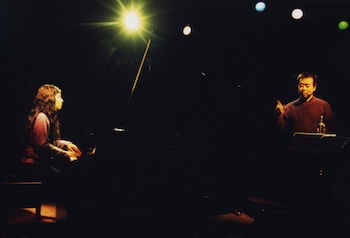Jazz Review: Crazy about Kaze, Satoko Fujii’s Quartet at the Lily Pad
Satoko Fujii’s quartet could go from 0 to 100 at the drop of a hat, but only once in a while, and nearly always at the perfect time.
By Steve Mossberg
The Japanese pianist and composer Satoko Fujii has history in Boston. She lived here for six years before returning to her native Tokyo, earning degrees at Berklee and New England Conservatory. In between songs at the Lily Pad in Cambridge on Monday night, she beamed from her piano, saying how happy she was to be back in her “second home.” As familiar as the experience was for her, this was the first time that she and her husband, trumpeter Natsuki Tamura, have brought her quartet Kaze to town, and the first time drummer Peter Orins and trumpeter Christian Pruvost, both young and French, have performed in the States.
Fujii is an artist with a large repertoire and over 60 recordings to her name. She works with lots of groups, ranging from small chamber ensembles to a full-on New York-based big band. Her bass-less quartet Kaze (it means “wind” in Japanese) has a new album called Tornado, but the group’s sound isn’t solely violent and elemental. The four pieces they played during the hour-long set were exercises in stretched time. The music built slowly and deliberately through long ambient stretches, and when the sophisticated melodies showed up, they were dispensed with in a matter of seconds. Fujii’s quartet could go from 0 to 100 at the drop of a hat, but only once in a while, and nearly always at the perfect time.
Kaze showed expertise in the creation of intriguing sound as well as traditional music. The concert began with an expansive 25-minute piece, the first third of which was essentially highly creative noise. Fujii does the now de rigueur fiddling around with the strings inside her instrument very well, creating long, clear droning sounds with one hand, freeing the other to roam the keys freely. With Orins scraping his cymbals and the trumpeters forcing air through their instruments, the quartet sounded like a clamorous soundscape, perfect accompaniment for the buses growling by outside in Inman Square and the steps of latecomers creaking across the Lily Pad’s floor. On Tamura’s explosive composition “Wao,” he and Pruvost dueled alternately on muted trumpets and duck calls. During the piece “Imokidesu,” Orins generated laughs by playing a combination of a Tibetan prayer bowl and a keychain, while Tamura used toy castanets to a surprisingly dramatic effect.
Though the compositions were carefully scripted, all four members of the group were given chances to improvise alone and with each other. Fujii once claimed in an interview that listening to Charlie Parker in college “gave her nightmares.” Her approach self-consciously departs from the bebop/modern jazz tradition. At times, her emphasis on space and delicate touch calls to mind the super subtle approach of her old teacher Paul Bley, but she also made use of rich romantic piano chords, spreading both hands wide, making the instrument sing like a chorus. Although the lines she played were often dissonant and clashing, she somehow was able to give the impression of never playing a wrong note. Unfortunately, during some powerful fortissimo moments the rest of the group overpowered her performance, to the point that she couldn’t be heard.

Satoko Fujii — despite her use of atonality, the pianist was somehow able to give the impression of never playing a wrong note.
Tamura and Pruvost, while both brash and free-jazzy, attacked the music from different angles. Tamura pulled off first-rate, outside-the-box playing on the piece “Triangle,” tearing through its blistering chromatic lines while the band drove energetically behind him. His young French counterpart chose to play only a few notes, focusing instead on creating an impressive range of sound effects. Sometimes manipulating a mute with his fingers, sometimes playing with a balloon animal he stuffed into the body of his trumpet, he was chameleonic throughout the evening: he could sound like a synthesizer, a DJ scratching his turntable, and a siren. Still, he didn’t want to be pigeonholed into the sound effect box. Pruvost also played a soulful unaccompanied solo, playing the blues in between gusts of furious cacophony.
Through the use of unorthodox techniques and strangely gripped sticks, Orins came off as a wholly organic drummer, projecting an illusion of naiveté that is deeply prized by the avant-garde. He gave the impression he was playing each of his rhythms for the first time, no matter how technically challenging they happened to be. During the opening piece, he shone in an unaccompanied section. For two minutes, he took a simple rock beat and chopped it to pieces, slowing it down and speeding it up like a warping cassette tape on fast-forward.
The audience at the Lily Pad had very few complaints, except when Fujii announced after only three songs that the group intended to play only one more (“Don’t worry, it’s long!”). The members of Kaze clearly enjoyed each other’s performances, happily laughing with the audience as well as with each other. Pruvost and Orins were cracking up along with the crowd after Tamura pulled out some tiny finger cymbals during an intimate piano solo. Fujii poked fun at Pruvost’s ability to speak not only French, but ‘Goose,’ a reference to the squawking sounds he made on the trumpet. The pianist proudly announced to listeners that Kaze was democratic because they all wrote music and contributed evenly to the group’s sound. And that sound is certainly equalitarian—romantic, cacophonous, intelligent, and thoroughly without pretense.
Steve Mossberg is a composer, jazz pianist, and music educator living in Somerville, MA. He holds an MMEd. From Boston Conservatory and has taught jazz piano at Clark University. In addition to teaching music in the Cambridge Public Schools, he performs regularly with many of Boston’s top musicians.

